Room 707: Home Away from Home
By Holly Prestidge
Photos by Daniel Sangjib Min
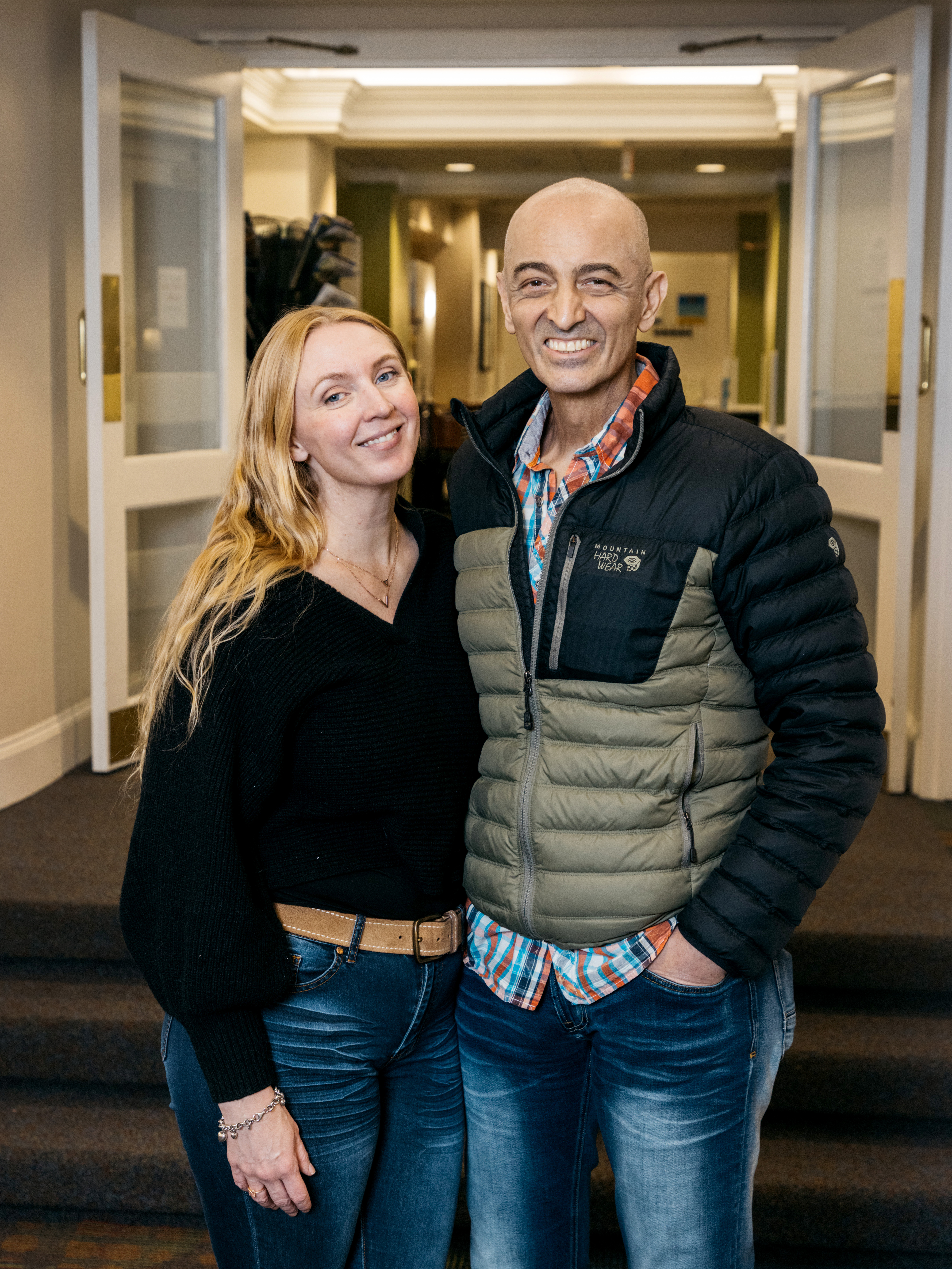
The fog that swirls around San Francisco’s famed Golden Gate Bridge and shrouds the iconic landmark in legendary mist does not always warn of its impending arrival or roll in gradually and gently.
Sometimes, it just appears.
Just like that.
In mere moments, visibility is zero. Sailors rely on fog horns to guide them safely through the channel. Even the most experienced nautical veterans face treacherous conditions. The unexperienced can fare far worse.
A longtime California resident named Kriss, who now lives in Virginia, knows how quickly these changes can happen — and how one’s life can transform just as swiftly.
---
This winter, he sat in the cozy library at The Doorways, a Richmond-based hospital hospitality house that provides accommodations for patients of VCU Health and other local hospitals and their families or caregivers. Next to him, Jessica, the love of his life, leaned in close.
Kriss explained how he led rescue missions around the Golden Gate Bridge when he worked on a special ops marine rescue team there during his time in the U.S. Coast Guard. The couple moved to Virginia four years ago and Kriss picked up where he left off, working now with the mostly volunteer Virginia Beach EMS Rescue on its marine rescue team.
An EMS medic since he was 15, he’s used to helping others through life-and-death emergencies.
But like that fog that appears without warning, an unforeseen adversary pushed its way into Kriss and Jessica’s lives in November 2022.
As the couple visited Charlottesville for Thanksgiving, Kriss began feeling under the weather. He was achy. He couldn’t sleep. By that Friday, something had changed.
His bones hurt. It was a pain he said he never experienced, and it was all over his body. Like a debilitating migraine, he recalls, that pulsated from his legs up into his ribs.
They drove back to Yorktown, where the couple lives, and Kriss went to his local emergency room.
Initial blood tests triggered alarm bells. His white blood cell count was off the charts — an indicator of leukemia — but more tests were needed. Kriss was transported to VCU Massey Comprehensive Cancer Center the following morning, where doctors ran more tests and later confirmed what Kriss and Jessica could scarcely believe.
It was indeed leukemia.
Disbelief was pushed aside as their lives quickly became a series of medical appointments and tests and chemotherapy. Ultimately Kriss would need a bone marrow transplant. Kriss and Jessica both stopped working as Kriss’s initial hospital stay on the MCV Campus stretched on.
Room 707 at The Doorways, located a few blocks from the hospital, became their home away from home as days turned into weeks, then months.
Simply put, Kriss and Jessica were reeling.
This time, there were no fog horns guiding their way to safety. They were navigating blind, save for a lifeline that appeared when they needed it most.
‘The House that Richmond Built’
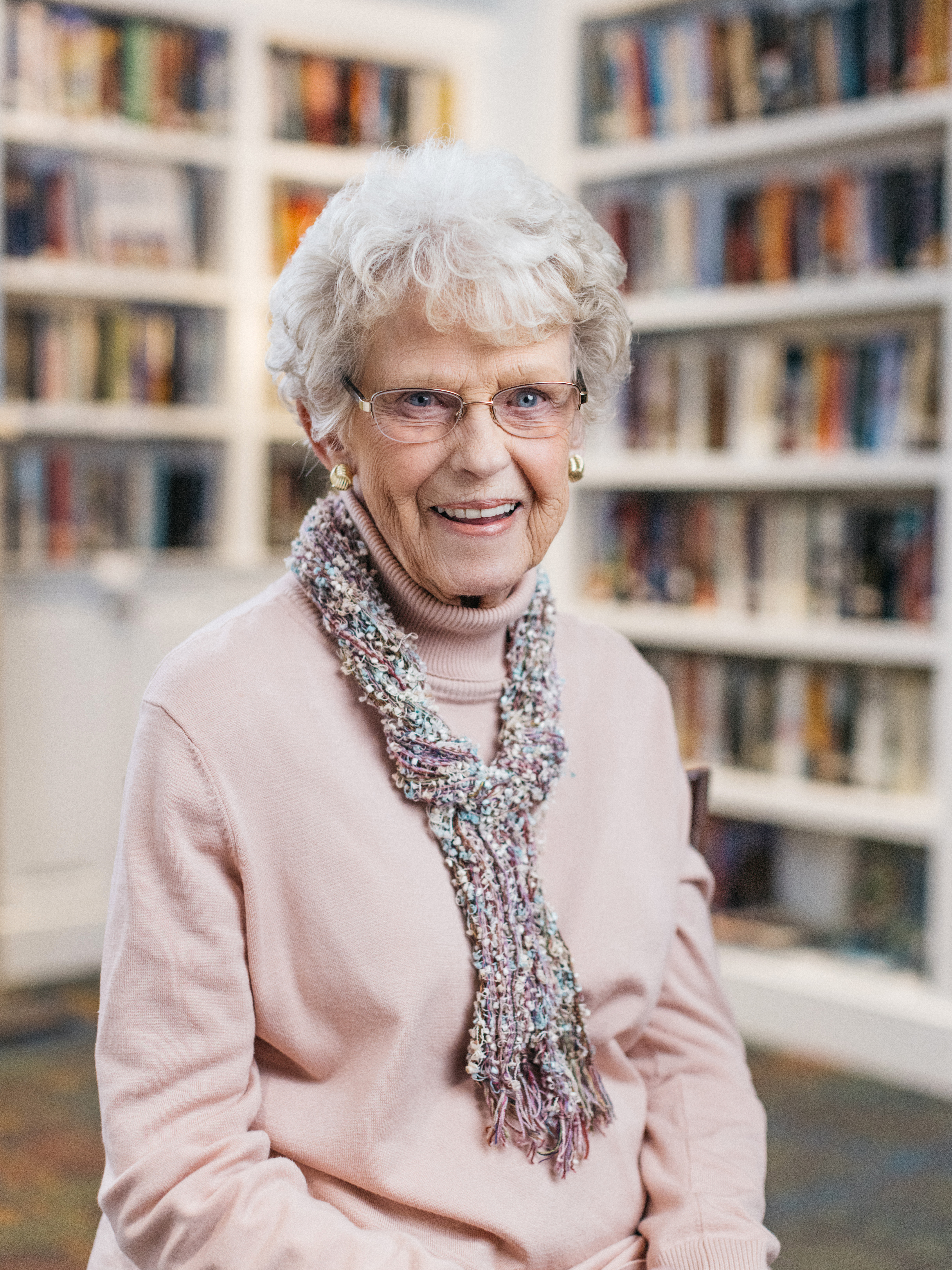
Scrolled across the arch that leads into The Doorways’ parking lot off 7th Street are the words: Between Healing & Home.
It’s a mantra brought to life 40 years ago by a small group of women who had no idea the lives they’d ultimately touch.
The Doorways — formerly the MCV/VCU Hospital Hospitality House — is among the largest hospital hospitality houses in the U.S. 2024 marks its 40th anniversary.
A former Day’s Inn that sits between Richmond’s Court End and Jackson Ward neighborhoods, The Doorways today serves more than 10,000 unique guests annually, with 90% of those being patients at VCU Health.
Available to those who live more than 30 miles from Richmond, its 117 rooms include specialized areas for pediatric patients, transplant patients and those with compromised immune systems. There’s laundry service, a fitness room, a reflection room, intimate TV lounges, multiple kitchens with a stocked pantry, a library and computer access. Guests are fed warm meals, thanks to small armies of volunteers who cook or donate daily meals and goods.
I am so grateful to all the people that have kept this going because this is a mammoth operation now.
Dolly Hintz, former MCV Foundation trustee
The average stay is 6.4 days. Some, however, like Kriss and Jessica, stay much longer.
A suggested donation of $15 per night is only that; more than half of those relying on The Doorways can’t afford to pay.
No one is turned away.
“It’s probably the worst time in the patients’ lives,” said Dolly Hintz, 89, a former member of the MCV Hospitals Auxiliary and one of five founders of the original hospital hospitality house. She is also a former trustee of the MCV Foundation. “But they have the comfort of a safe place to stay, they’re going to have a good meal and they know they’re going to get a hug if they really, really need it.”
Dolly remains a steadfast cheerleader and doting ambassador for The Doorways. As she spoke, the building hummed around her. Guests ate lunch in the dining room. New guests checked in.
Others in the kitchen prepped for dinner that night. On average, The Doorways hosts approximately 150 guests nightly and by dinnertime, the dining room fills up.
Dolly admits she is in awe of what The Doorways has become. She quickly deflects any credit for that.
A former nurse who moved with her husband and family to Richmond in 1980, Dolly began serving at the VCU Hospital on the MCV Campus as a patient volunteer, visiting patients to offer magazines or books or a friendly chat – anything she could do to make them comfortable.
She joined the MCV hospital auxiliary, and it wasn’t long before she and others noticed something. Family members trying to stay close to loved ones in the hospital were sleeping on makeshift beds. They washed clothes — or themselves — in the bathrooms.
A peer of Dolly’s had heard about hospital hospitality houses, and tasked Dolly and others to visit some, both in Charlottesville and in neighboring states. The ones they visited were homes that that had been converted to accommodate a handful of guests.
Dolly said they reported back to the auxiliary board their findings and set out to determine if they could do something similar for the MCV Campus. They asked VCU leadership at the time if there were any vacant buildings on campus.
There was one.
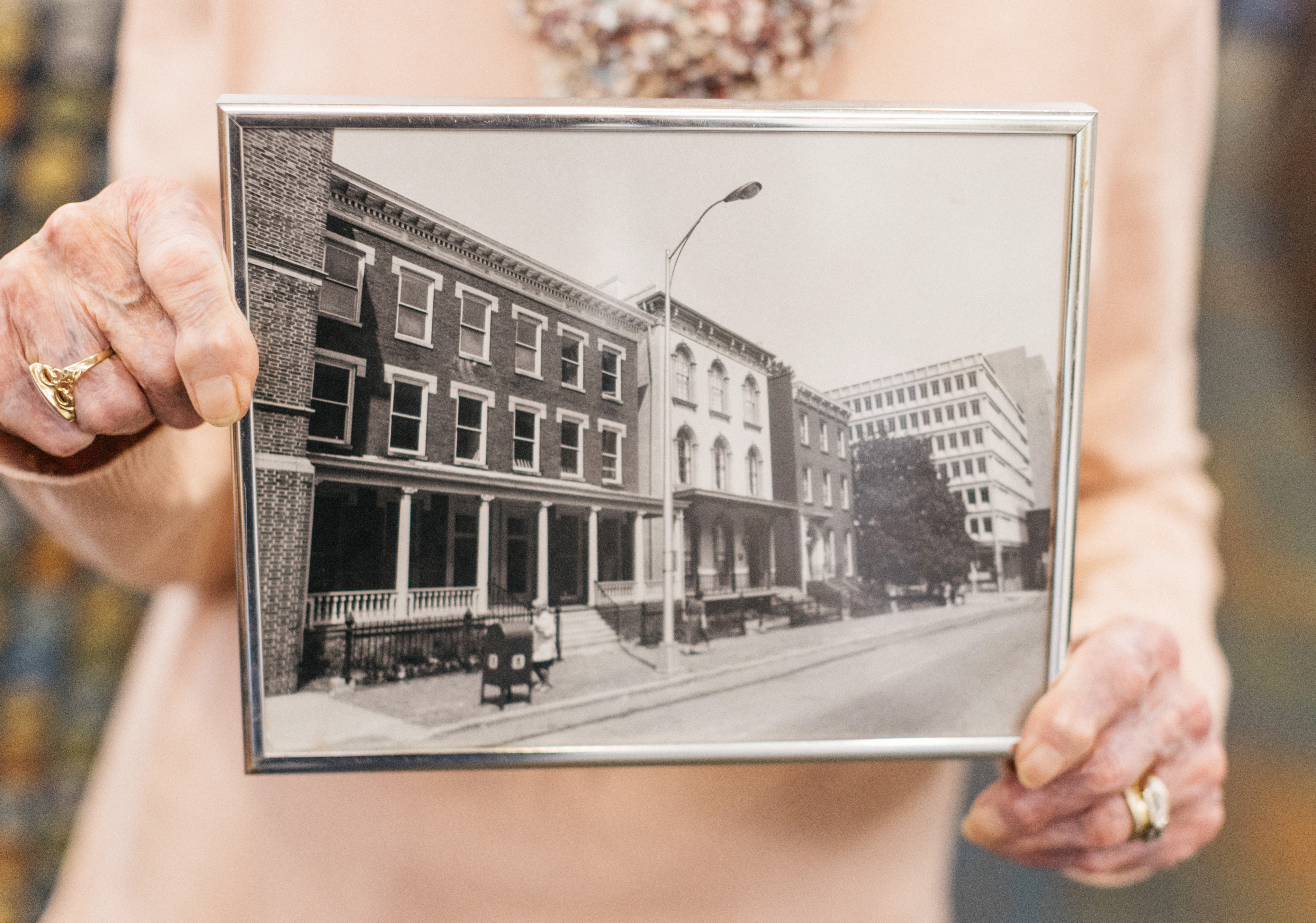
The Zeigler House on Marshall Street — mere steps from the hospital — had been vacant for several years.
“It was a mess,” Dolly recalled, chuckling at memories of that initial walk through. But she saw past the dirt and grime and focused on the potential: tall windows that let in ample sunlight, and eight bedrooms that could fit multiple beds dormitory-style. The university rented it to them for $1 a year.
The catch: they had to raise $250,000 for renovations.
“We’re talking about 15 or 16 women on the board and the most we’d ever raised was $5,000,” Dolly said. “This was a big deal and none of us really knew anything about what we were doing but it was just instinct and the desire to make it happen.”
That, and “I always felt someone was on our shoulders, helping us along,” she said with a smile.
They simply got to work. They made lists and reached out to any individual, church group, civic organization and corporate entity they could find who might be willing to offer funds.
When donations began rolling in, work began. The MCV/VCU Hospital Hospitality House was established in 1983 and officially began accepting guests in February 1984.
At full capacity, the Zeigler House accommodated 28 guests.
“It was immediately full,” Dolly said.
Its impact was immediate, too. She recalled meeting a man within that first year who lost his wife. He’d been staying at the house while his beloved spouse was in the hospital. Despite his grief, it was that house, he told Dolly, that became a refuge for him. The people there had become his family and his support.
“Just hearing that, it was tremendous,” Dolly said. “The family member is the forgotten member of the health care team, and it’s important for the patients to have their families nearby.”
But the Zeigler House was only the first chapter. By the early 1990s, advancements and changes in health care meant patients no longer needed long hospitals stays. But they still needed to return to the MCV Campus for follow-up treatments.
That need was bigger than Zeigler House.
The next 40 years are very bright for The Doorways.
Stacy Brinkley, president and CEO, The Doorways
The hospitality house board began searching for a larger building. Dolly explained that this group often met at the nearby Sixth Street Marketplace for turkey sandwich lunches. One day, they learned that the Day’s Inn a block away had gone into foreclosure.
“There it was — again,” Dolly said. “It was a mess, but it was perfect.”
The fundraising continued, this time with a goal of upwards of $1 million to purchase the aging hotel and provide support for critically needed renovations.
By 1994, the Zeigler House had been replaced by the new hotel building. In April 2015, the MCV/VCU Hospital Hospitality House rebranded as The Doorways. Since 1984, both have served more than 215,000 people with more than 1.3 million nights of lodging.
“We see our guests every day and get to experience their highs and lows with them and it becomes a community — that’s really what makes it so special,” said Stacy Brinkley, president and CEO of The Doorways.
“When you’re going through something that others are going through, even if you’re from very different walks of life, you bond over that experience,” she said. “It makes it bearable as you walk through the journey of that health care crisis.”
The first 40 years have been remarkable, she said, thanks to the courage and fortitude of Dolly and the MCV hospital auxiliary.
But there are more chapters to come, as The Doorways is once again searching for a new home.
As a strategic partner with VCU Health, Brinkley said she works closely with the hospital to support its mission and the ever-changing nature of health care. As guests increasingly include the patients themselves and not just the family members, she said The Doorways is looking to find a new location with upwards of 145 rooms. That would include 55 extended-stay rooms — they currently have six — for people like Kriss and Jessica, plus nearly as many studios for those staying a few weeks or a month and upgraded deluxe rooms for those who stay about a week.
“We stay close to the hospital so we can be the best partner we can be,” Brinkley said. “We talk about The Doorways being a home away from home and we try to maintain that home-like environment with all the support services someone might need, so it’s as easy for our guests as possible.”
“The next 40 years,” she said, “are very bright for The Doorways.”
Dolly agreed.
“It’s just evolved into something that we never, ever believed,” Dolly said softly. “I am so grateful to all the people that have kept this going because this is a mammoth operation now.”
Dolly marvels at the idea that, despite the requirement of living outside of Richmond to utilize The Doorways, it was the Richmond community that made it happen.
“We think of it as the house that Richmond built,” she said. “It just came as this little idea and so many people absorbed that idea and worked on it and still are and will, for perpetuity, I hope.”
Community of Caring
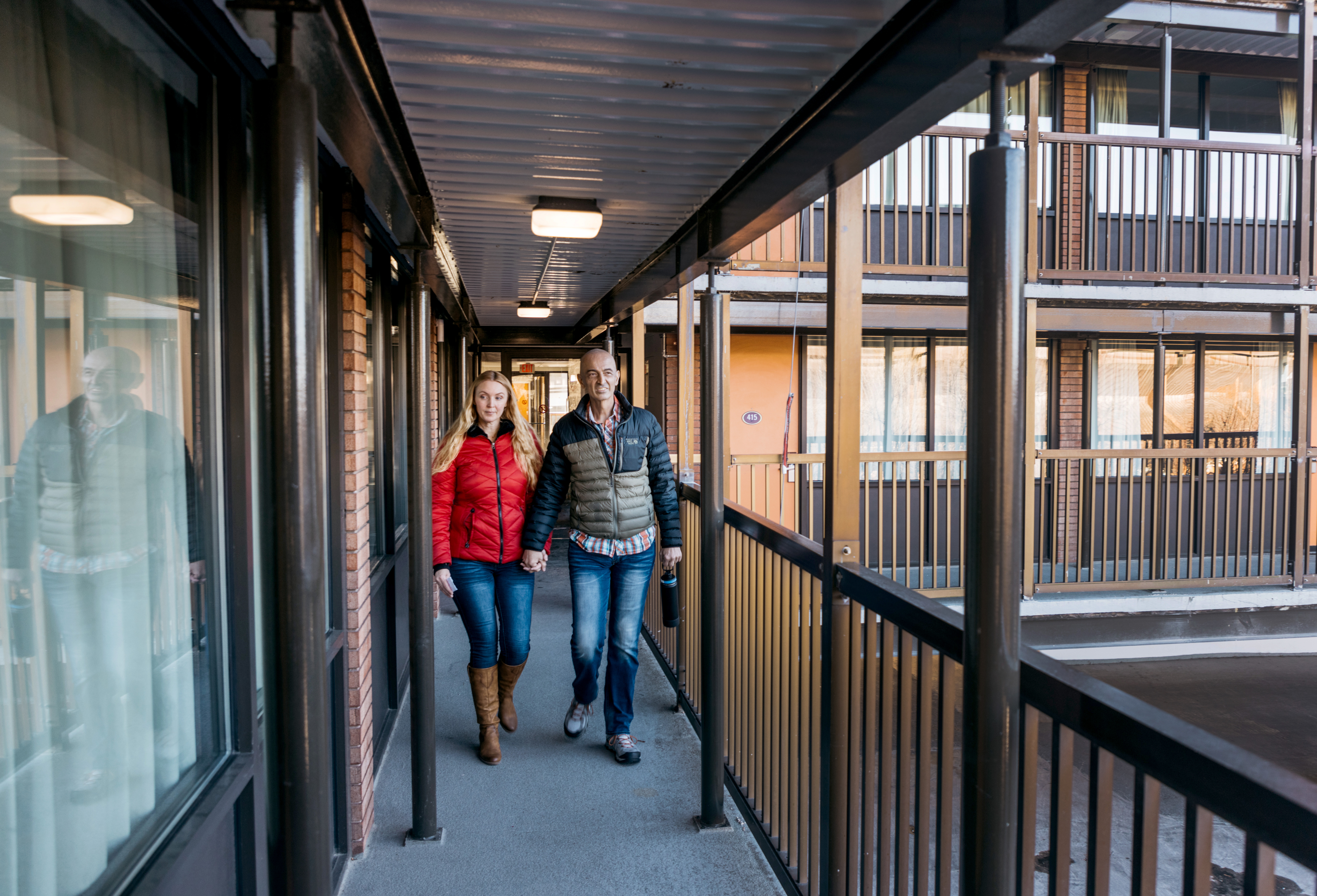
Just before Thanksgiving last November, Jessica stirred a packet of instant oatmeal at the kitchenette counter in their room and handed the bowl to Kriss.
A lot has changed in a year. Small gestures became milestones.
When Kriss began his initial three-month stint in the hospital, Jessica lived at The Doorways.
Room 707 was both her respite and her connection to him.
“At first, it was a step-by-step process, and we could only see maybe a few weeks in front of us,” Jessica explained about those early days in late 2022. “We didn’t know we would be here for over a year.”
She continued. “The Doorways was available to me during his whole hospital stay — that was a huge relief because I didn’t have to drive back home and leave for hours.”
The option of having a place to rest, shower, maybe prep a quick meal and still be near him was a comfort she did not take for granted.
That, and “a hotel would have completely drained our finances,” she said. “We had no idea we’d have to prepare to be off for a year from work so being here was a huge blessing.”
When Kriss was discharged following his bone marrow transplant, he joined her in Room 707. They couldn’t go home, because he still needed to be near the hospital for follow-up care or if he experienced an emergency.
Turns out, three times in the following months, Jessica said, Kriss needed to be rushed back to the hospital. The proximity likely saved his life.
Room 707 was their home away from home for part of the week when they visited the MCV Campus for his weekly treatments.
Thanks to a bone marrow transplant made possible by stem cells from his son, Armeen, Kriss is in remission. He’s getting stronger every day. He’s slowly getting back to work.
Despite his ordeal, Kriss keeps coming back to gratitude.
For the doctors and nurses and countless others who restored his body.
For The Doorways staff who restored his soul.
For the love of his life who put her life on hold in an instant to take care of his.
For life’s simple pleasures, like the vegan milkshakes they discovered in Carytown as they’ve gotten to know Richmond in the last year.
“We all have hardships in our lives, but hardships are really blessings because you build a circle of compassion in your life,” said Kriss, fighting back tears. The entire experience – from his initial stay and the subsequent care on the MCV Campus — to the comfort of having Jessica nearby all the time, has healed more than just this body.
When they first arrived in Richmond and were awaiting test results, Kriss explained that they stayed in a hotel. He was in a wheelchair. He will never forget the way others reacted to him.
“An outlier,” Kriss said, referring to how he felt in that environment. “I couldn’t make it to the elevator without calling attention to myself.”
At The Doorways, however, they found a sanctuary.
“There’s just incredible sincerity from the entire staff,” Kriss said. “The culture is so sweet. They make you feel welcome and not like you’re an outcast.”
His life’s journey spans health care and volunteering to military service. He thrives in team environments. What he experienced on the MCV Campus and at The Doorways fuels his desire to get better.
“The cohesiveness of the teamwork and compassion shown by the staff and the doctors — it has completely revitalized my faith in medicine,” Kriss said.
“There’s a community of caring here and my body and my soul have just become a part of this.”
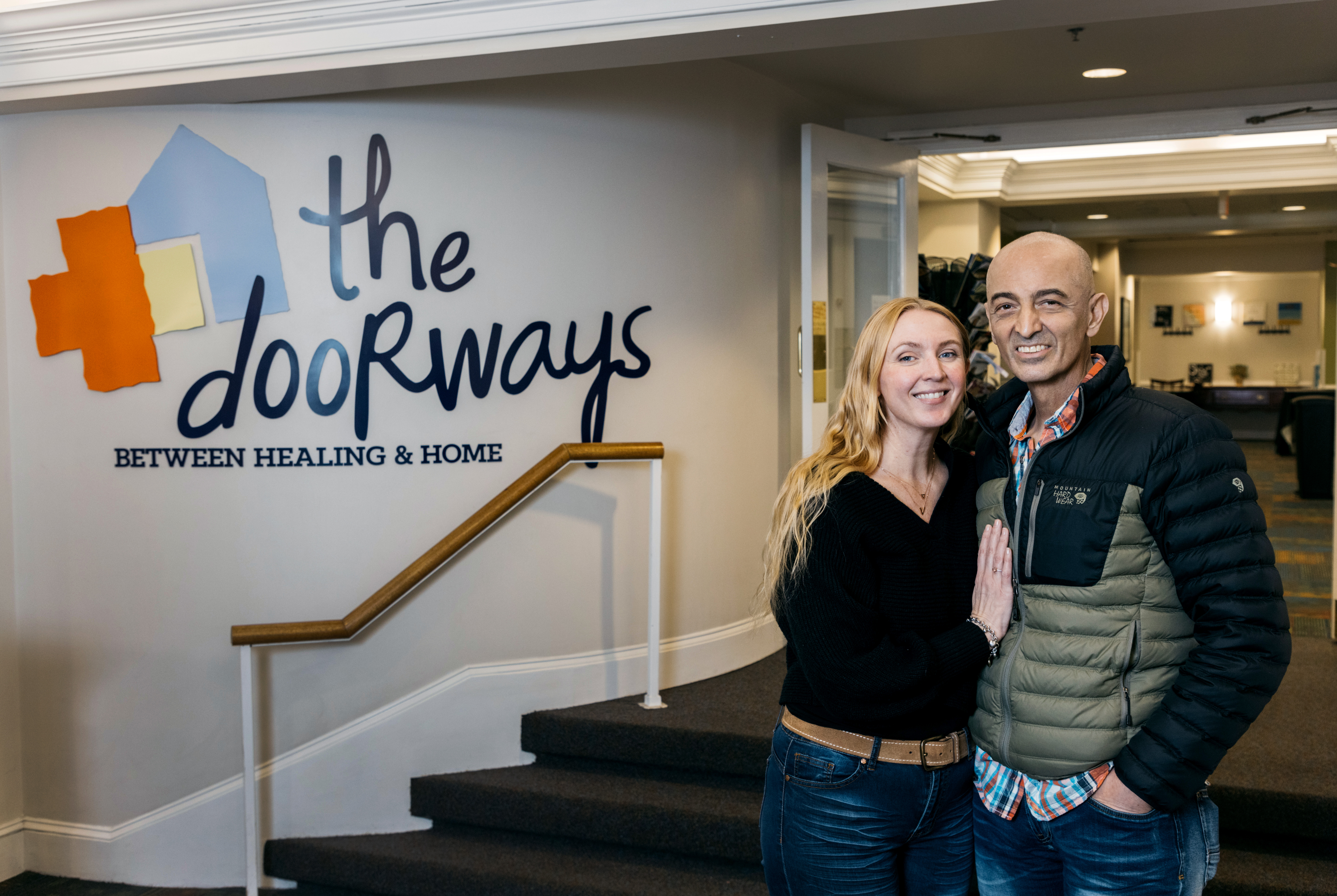
If you would like to support the healing mission of VCU Health on the MCV Campus, please contact Brian Thomas, executive vice president and chief development officer at the MCV Foundation, at 804-828-0067 or brian.thomas@vcuhealth.org
Support a Healthy Community
You can help improve and save lives by giving to VCU Health through the MCV Foundation.